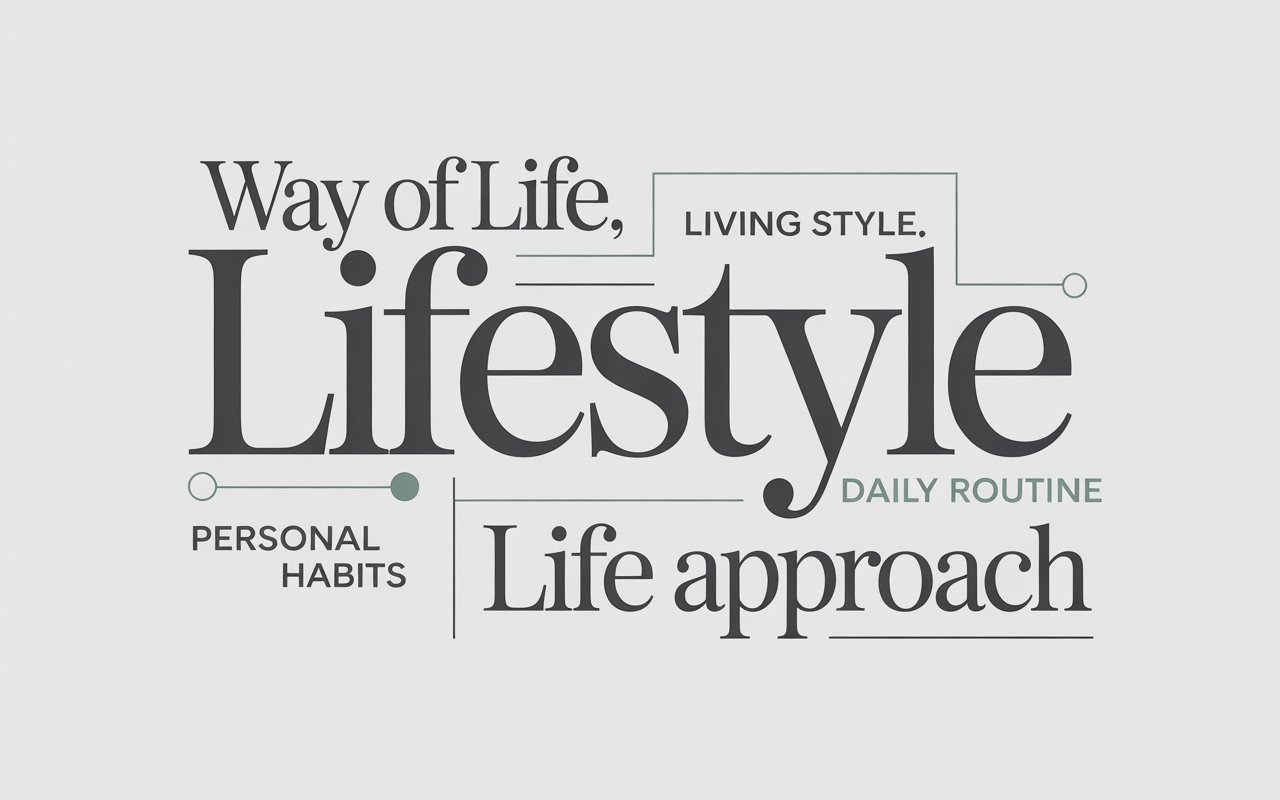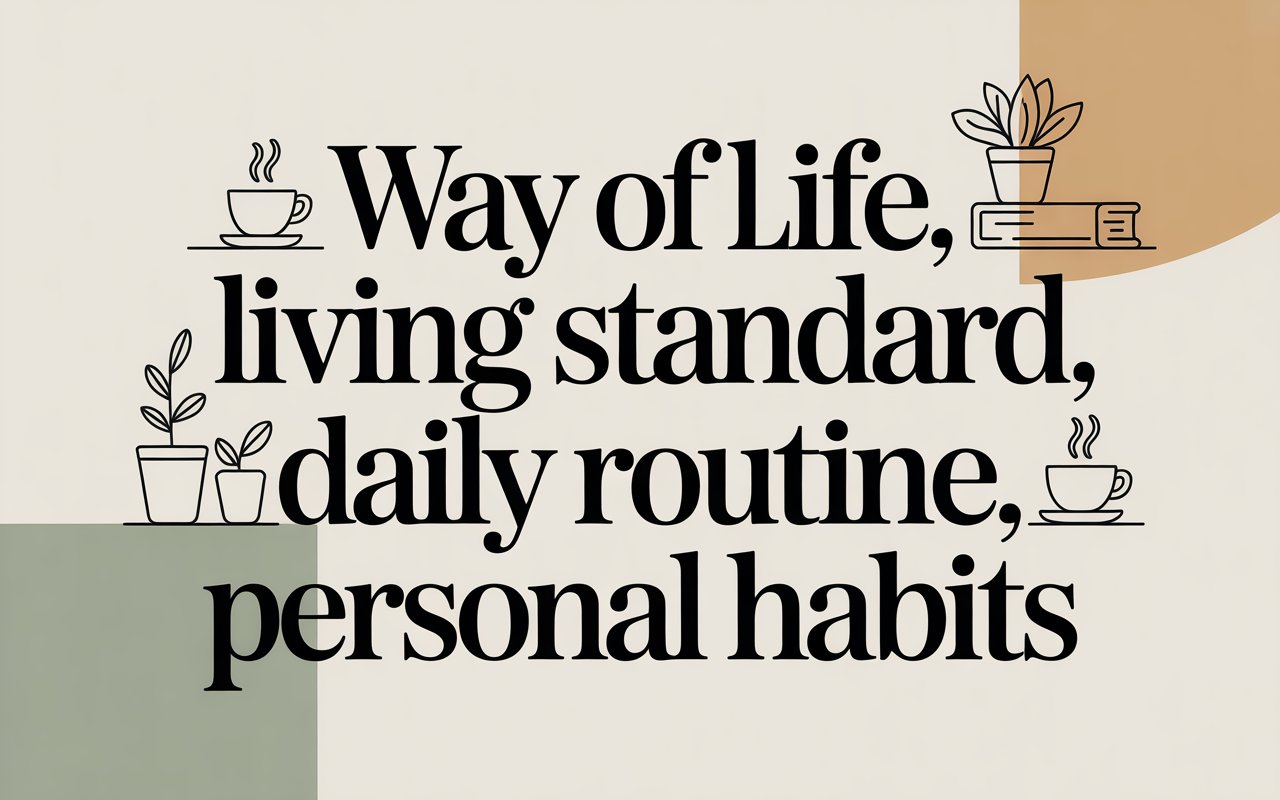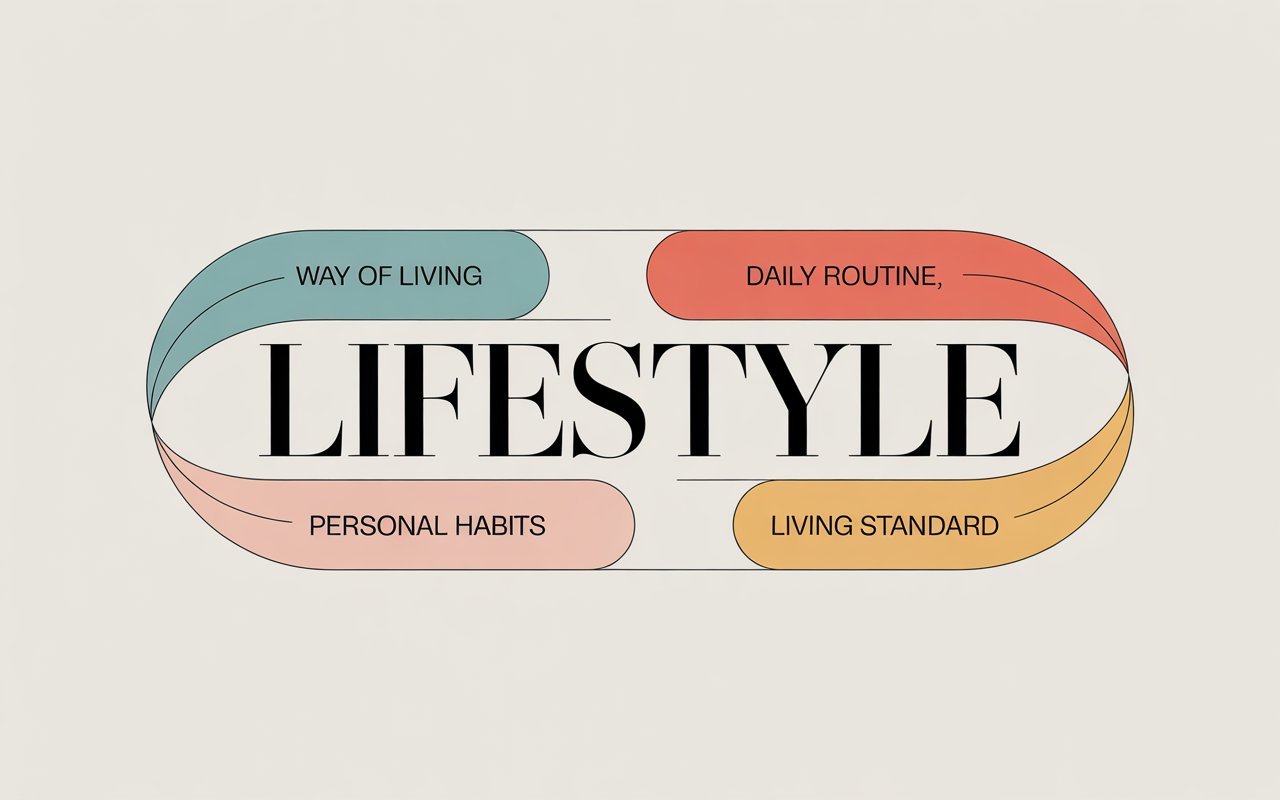When you think about the word “lifestyle,” what comes to mind? Maybe it’s how you dress, the food you eat, or how you spend your weekends. Lifestyle is a word we use every day — but what if you wanted to describe it differently? There are plenty of synonyms for “lifestyle” that express the same idea with a slightly different flavor. Each synonym offers its own shade of meaning, helping us see life from fresh angles.
In this article, we’ll unpack what lifestyle truly means, explore its synonyms and related terms, and see how each one captures a unique dimension of human living. Ready? Let’s dive into the many ways to describe the way we live.
What Does “Lifestyle” Really Mean?
Before we look at synonyms, it’s important to understand what “lifestyle” actually represents.
At its core, lifestyle is the way a person or group lives — shaped by choices, habits, values, and environment. It’s a reflection of who we are and how we interact with the world around us.
Think of lifestyle as a canvas. The colors are your daily choices — the kind of work you do, the food you eat, your hobbies, relationships, and even the way you spend your money. Together, they paint a picture that’s uniquely yours.
1. Way of Life – The Universal Substitute
The most direct synonym for lifestyle is “way of life.” It’s simple, clear, and fits almost every context.
For example:
-
“A rural way of life” evokes images of simplicity and connection with nature.
-
“A modern urban way of life” brings to mind a fast-paced, tech-driven existence.
This term highlights how circumstances and choices shape our daily patterns. Whether you’re talking about a community, a culture, or an individual, way of life easily captures the essence of lifestyle.
2. Mode of Living – Subtle Sophistication

A slightly more formal alternative is “mode of living.” It’s often used in academic or descriptive writing to explain social or economic habits.
For instance:
-
“The traditional mode of living is gradually fading with globalization.”
It emphasizes structure and system — the framework through which people live rather than just personal choices.
3. Daily Routine – The Habitual Aspect
When we talk about what we actually do every day, the word “daily routine” fits perfectly. While “lifestyle” paints a broader picture, “daily routine” zooms in on the smaller brushstrokes — your morning coffee, commute, exercise habits, and bedtime rituals.
Your daily routine can say a lot about your overall lifestyle. Someone with a healthy daily routine likely maintains a balanced lifestyle, while someone with disorganized habits may struggle with time management or well-being.
4. Standard of Living – The Economic Perspective
Standard of living is often used to describe how comfortable or wealthy people are based on income, housing, and access to goods or services.
For example:
-
“The standard of living in Scandinavian countries is among the highest in the world.”
This synonym focuses less on personal habits and more on material quality of life — the resources and comforts people enjoy.
5. Way of Being – The Philosophical Angle

For a more spiritual or introspective take, the phrase “way of being” captures lifestyle on a deeper level. It’s not just what you do but how you exist.
It reflects your mindset, emotions, and inner world — how you respond to life rather than just how you live it. A minimalist’s way of being, for example, is rooted in simplicity and presence, not just owning fewer things.
6. Habits and Patterns – The Behavioral Side
Habits form the backbone of every lifestyle. The phrase “habits and patterns” describes the repetitive actions that shape your days and long-term outcomes.
Think about it — our habits are like invisible architects building our lives brick by brick. A person who reads daily or eats healthily develops a pattern that contributes to an intellectual or wellness-oriented lifestyle.
Breaking old habits or forming new ones often leads to a shift in lifestyle — proof that small actions have a big impact.
7. Culture and Customs – The Collective Lifestyle
When lifestyle is viewed through the lens of a society rather than an individual, “culture” and “customs” become fitting synonyms.
Culture includes traditions, shared beliefs, language, art, and social norms. For example:
-
“Japanese culture values harmony and respect.”
-
“Mediterranean customs emphasize family, food, and togetherness.”
In this sense, lifestyle becomes something collective — a shared rhythm of life that binds people together.
8. Ethos – The Character of a Lifestyle

The word “ethos” refers to the guiding beliefs or spirit of a community or individual. It’s like the soul of a lifestyle — what drives the way people act or live.
For example:
-
“The minimalist ethos encourages intentional living.”
Ethos captures the moral or philosophical essence of a lifestyle rather than its surface habits. It’s about values, attitudes, and purpose.
9. Living Conditions – The Practical Dimension
Another synonym that tilts toward reality rather than ideals is “living conditions.” It refers to the physical and social environment in which someone lives — housing quality, access to healthcare, education, and safety.
For example:
-
“Improving living conditions is crucial for community development.”
While not as personal as “way of life,” it’s still a vital part of understanding lifestyle from a societal or policy perspective.
10. Mindset and Outlook – The Internal Lifestyle
Sometimes, lifestyle isn’t about what you own or do but how you see the world. In this case, “mindset” or “outlook” are appropriate synonyms.
A positive outlook, for instance, contributes to a healthy lifestyle. Similarly, someone with a growth mindset continuously improves their habits and personal well-being.
As the saying goes, “Change your mindset, change your life.” Your internal world often mirrors your external lifestyle.
11. Rhythm of Life – The Poetic Expression
If “lifestyle” were a song, “rhythm of life” would be its melody. This phrase paints a more poetic picture of how we move through our days — fast or slow, balanced or chaotic.
Everyone’s rhythm of life is different. Some people prefer the steady beat of routine; others thrive on spontaneity and adventure. Recognizing and adjusting your rhythm can lead to more harmony and fulfillment.
12. Personal Philosophy – Living by Principles
Another way to describe lifestyle is through your personal philosophy — the principles and beliefs that guide your actions.
For example:
-
A person who values sustainability may adopt an eco-friendly lifestyle.
-
Someone who prioritizes self-care may design a slower, more intentional life.
In essence, your personal philosophy acts as your life compass, influencing every choice and defining your unique version of “lifestyle.”
Why Synonyms Matter When Talking About Lifestyle
You might wonder, why bother finding synonyms at all?
Well, language shapes understanding. Using different words like way of life, mindset, or ethos allows us to express subtleties in meaning that “lifestyle” alone can’t cover.
It’s like looking at a diamond from different angles — each synonym reflects a different facet of how people live, think, and thrive.
Moreover, in communication — especially writing or storytelling — variety keeps readers engaged. Swapping repetitive words for their meaningful alternatives adds depth and color.
How Lifestyle Synonyms Shape Our Perception
The words we use to describe life can influence how we perceive it. For example:
-
“Way of life” emphasizes habits and culture.
-
“Standard of living” spotlights comfort and wealth.
-
“Mindset” turns attention inward, toward thoughts and emotions.
By choosing our words carefully, we can shift from judging lifestyles to understanding them — seeing people’s choices not as right or wrong but as reflections of different circumstances and values.
The Changing Nature of Lifestyle Language
Over time, the language of lifestyle evolves with society. Decades ago, “modern way of living” referred to industrial progress. Today, it might mean digital minimalism or remote work.
Words like “wellness,” “mindful living,” and “work-life balance” have emerged to describe 21st-century concerns. This evolution shows that lifestyle isn’t static — it’s a living, breathing concept shaped by our times.
Embracing Diversity in Ways of Life
Every synonym we’ve discussed reminds us of a simple truth: there’s no single right way to live. From cultural customs to individual philosophies, the diversity of lifestyles is what makes humanity fascinating.
Whether someone chooses a slow-paced countryside life or a buzzing city routine, each reflects a meaningful choice. Just as no two fingerprints are alike, no two lifestyles are identical.
Frequently Asked Questions (FAQs)
1. What is the best synonym for lifestyle?
The most common and flexible synonym is “way of life.” It fits most contexts, whether describing individuals, groups, or cultures.
2. How do “standard of living” and “lifestyle” differ?
Standard of living focuses on economic comfort and access to resources, while lifestyle includes habits, attitudes, and personal choices that define how someone lives.
3. Can “mindset” really replace “lifestyle”?
Not directly, but “mindset” reflects the internal aspect of lifestyle — how one’s thoughts and attitudes shape daily life and choices.
4. Are lifestyle and culture the same thing?
Not exactly. Lifestyle refers to personal ways of living, while culture represents the shared customs and beliefs of a group or society.
5. Why is understanding lifestyle synonyms important?
Using synonyms helps communicate more precisely. Each term highlights a different perspective — economic, behavioral, spiritual, or social — giving a richer understanding of how people live.
Conclusion: More Than Just a Word
In the end, “lifestyle” is more than just a label — it’s a story, a reflection, a rhythm. Its synonyms — from way of life to mindset — reveal the many layers of human existence.
They remind us that living isn’t just about surviving or earning; it’s about being, choosing, and creating a life that feels true to who we are. So next time you hear the word “lifestyle,” remember — it’s not one-size-fits-all. It’s a living poem, and every synonym adds a new verse.











